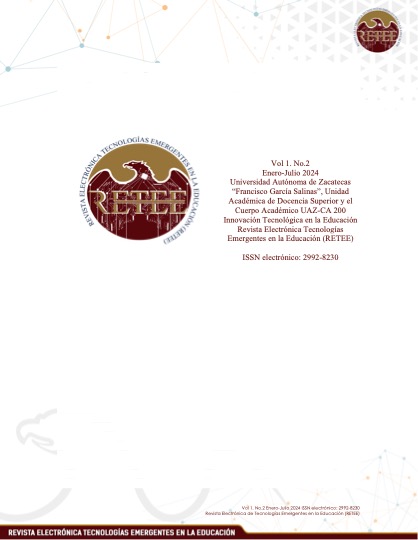Padlet as an empowering tool in the development of competencies techno-pedagogical in university students
Published 2025-01-08 — Updated on 2025-01-28
Keywords
- Collaborative learning,
- Competency development,
- Higher education teaching,
- Educational institutions,
- Padlet
- Educational technology ...More
Copyright (c) 2025 Dimas De Dios Vásquez

This work is licensed under a Creative Commons Attribution 4.0 International License.
How to Cite
Abstract
Although the Pedagogy Career has successfully virtualized 100% of its classes and at least 80% of students graduate with academic excellence, there is little evidence that students are developing innovative skills applicable to educational settings. There is a clear need to connect students with the new technologies of the digital age. This study aims to assess the impact of the Padlet tool in Educational Technology I and II classes as an innovative alternative for enhancing the training process for university students.
The methodology used involved the use of an instructional design, under a quantitative study. Twenty-five students from the Pedagogy Career at Universidad Nacional Autónoma de Honduras participated over a six-month period, spanning two academic terms in 2022 under a virtual format. The study included students between the ages of 22 and 30, considering the nature of the online learning modality, as well as their access to technological resources such as the internet, a computer, or a mobile phone.
The results indicate a high level of student acceptance, sparking greater interest in learning. Despite system limitations and the challenges of incorporating and adapting innovative strategies in higher education, the findings suggest that today’s students learn more effectively through innovation and creativity. Therefore, Padlet is presented as an effective alternative for fostering techno-pedagogical skills in professional training processes.
Downloads
References
- Bernate, J. A. (2021). Tendencias en los sistemas educativos del siglo XXI. Sophia, 17(1), 58-75. https://doi.org/10.18634/sophiaj.17v.1i.1015
- Ccoa, O. (2023). Padlet: una alternativa para mejorar la comprensión lectora. Technological Innovations Journal, 2(1), 7–21. https://doi.org/10.35622/j.ti.2023.01.001
- Castellanos, J. C. y Niño, S. A. (2020). Aprendizaje colaborativo en línea, una aproximación empírica al discurso socioemocional de los estudiantes. Revista Electrónica de Investigación Educativa, 22, e20, 1-12. https://doi.org/10.24320/redie.2020.22.e20.2329
- Delgado-Ramirez, J. C., Chamba-Gomez, F. D., Cuenca-Masache, D. T., y Ancajima-Mena, S. D. (2022). Padlet como Herramienta de Difusión Digital en la Investigación Formativa de Estudiantes Universitarios. Revista Tecnológica-Educativa Docentes 2.0, 14(2). https://doi.org/10.37843/rted.v14i2.294
- Domingo Roget, A. (2022). La Práctica Reflexiva: un modelo transformador de la praxis docente. Zona Próxima, 34, 1–21. https://doi.org/10.14482/zp.34.370.71
- Espíritu Martínez, Y., Barrantes Santos, F. y Siguas Chavarría, P. (2022). La integración de las TIC en la educación superior: Aprendizajes a partir del contexto covid-19. Ciencia Latina Revista Multidisciplinar, 6 (2).
- García, N. M., Paca, N. K., Arista, S. M., Valdez, B. B., & Gómez, I. I. (2018). Investigación formativa en el desarrollo de habilidades comunicativas e investigativas. Revista de Investigaciones Altoandinas, 20(1), 125-136.
- Hernández Sampieri, R., Fernández Collado., & Baptista Lucio, P. . (2014). Definiciones de los enfoques cuantitativo y cualitativo, sus similitudes y diferencias. RH Sampieri, Metodología de la Investivación, 22.
- Herrera-Pérez, J. y Ochoa-Londoño, E. (2022). Análisis de la relación entre educación y tecnología. Cultura,
- Kuhn, T. (1962). Teoría de las revoluciones científicas. México: Fondo de Cultu.
- La etica en investigacion 2017. (n.d.).
- La integración de las TIC en la educación superior: Aprendizajes a partir del contexto covid-19. (2022). Ciencia Latina Revista Científica Multidisciplinar, 6(2), 4260–4277. https://doi.org/10.37811/cl_rcm.v6i2.2162
- Leyva López, H. P., Pérez Vera, M. G., y Pérez Vera, S. M. (2018). Google Forms en la evaluación diagnóstica como apoyo en las actividades docentes. Caso con estudiantes de la Licenciatura en Turismo / Google Forms in the diagnostic evaluation as support in the teaching activities. Case Students Bachelor of Tourism. RIDE Revista Iberoamericana Para La Investigación y El Desarrollo Educativo, 9(17), 84–111. https://doi.org/10.23913/ride.v9i17.374
- Orozco, H., y Lamberto, J. (2022). La ética en la investigación científica: consideraciones desde el área educativa. Perspectivas: Revista de Historia, Geografía, Arte y Cultura, 10(19), 11–21. Universidad Nacional Experimental Rafael María Baralt. https://doi.org/link-referencia
- Rivadeneira Pacheco, J. L., Barrera Argüello , M. V., & De La Hoz Suárez, A. I. (2020). Análisis general del spss y su utilidad en la estadística. E-IDEA Journal of Business Sciences, 2(4), 17-25. Recuperado a partir de https://revista.estudioidea.org/ojs/index.php/eidea/article/view/19
- Sánchez Molina, A. A., y Murillo Garza, A. (2021). Enfoques metodológicos en la investigación histórica: cuantitativa, cualitativa y comparativa. Debates por la Historia, 9(2), 147-166. https://doi.org/10.54167/debates-por-la-historia.v9i2.792
- Sevilla-Rodríguez, M. E., y Castro-Salazar, A. Z. (2021). Padlet como estrategia de enseñanza colaborativa en el proceso de aprendizaje. cienciamatria, 7(13), 173–192. https://doi.org/10.35381/cm.v7i13.478.
- Sociedad, U. Y. (2020). Volumen 12 | Número 1 | Enero-Febrero. https://orcid.org/0000-0002-6318-1780
- Universidad Nacional Autónoma de Honduras. (2015). Normas académicas de la UNAH (Serie: Publicaciones de la Reforma Universitaria No. 6). Primera edición. Vicerrectoría Académica.


